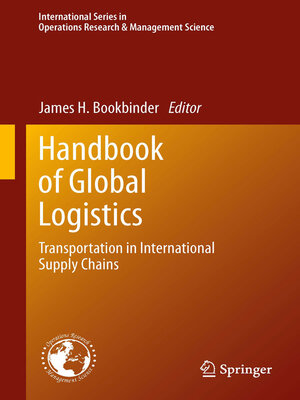Handbook of Global Logistics
ebook ∣ Transportation in International Supply Chains · International Series in Operations Research & Management Science
By James H. Bookbinder

Sign up to save your library
With an OverDrive account, you can save your favorite libraries for at-a-glance information about availability. Find out more about OverDrive accounts.
Find this title in Libby, the library reading app by OverDrive.



Search for a digital library with this title
Title found at these libraries:
| Library Name | Distance |
|---|---|
| Loading... |
Global logistics entails tradeoffs in facility location, distribution networks, the routing and scheduling of deliveries by different modes of travel (e.g., air, water, truck, rail), procurement, and the overall management of international supply chains. In an increasingly global economy, then, logistics has become a very important matter in the success or failure of an organization. It is an integral part of supply chain management that involves not just operations management considerations, but production engineering and regional science issues as well.
As Director of the prestigious Waterloo Management of Integrated Manufacturing Systems Research Group (WATMIMS), which specializes in logistics and manufacturing, Jim Bookbinder is uniquely qualified to edit a handbook on global logistics. He has aligned a set of prominent contributors for this volume.
The chapters in the Handbook are organized into discrete sections that examine modes; logistics in particular countries; operations within a free-trade zone; innovative features impacting international logistics; case studies of specific companies; and a look toward the future. Contributors are from the Americas, Europe, and Asia, and they push the state of the art in areas such as trade vs. security; border issues; cabotage within NAFTA; Green logistics corridors within the EU; inland ports; direct-to-store considerations; and all the questions that need to be confronted in any given region. This will certainly appeal to researchers and practitioners alike, and could serve as required or supplementary reading in graduate-level logistics courses as well.







